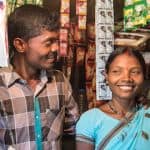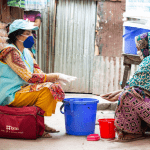Second-Generation Graduation: New Ways to Scale a Proven Anti-Poverty Model
Editor’s note: This post is the first in a series that explores the way in which the Graduation strategy, a program that helps families in extreme poverty “graduate” into sustainable livelihoods, is changing the lives of millions of families – and how Fundación Capital is changing and adapting the program to reach even more people. To learn more about Graduation, click here.
Last year, financial institutions, governments, foundations and global leaders stood up to end poverty, protect the planet and ensure prosperity for all. The UN Sustainable Development Goals, signed just over a year ago, address 17 issues across a range of areas, but the number one priority is simple, clear and ambitious: No poverty.
This matches our mission at Fundación Capital. Our programs work to connect some of the world’s poorest and most vulnerable citizens to new opportunities and new resources, while helping them to realize their own potential and effecting change at a systemic level.
Following comprehensive studies on the “Graduation” model, an entrepreneurial training program for people in extreme poverty, the global development community has looked into ways to scale this proven approach. Graduation approaches use a 16- to 24-month sequenced program that takes people from basic survival to achieving sustainable livelihoods by creating their own businesses.
Our Graduation strategies build on proven methodologies to reach the poorest households with entrepreneurship training, exposure to new technologies, and a suite of carefully timed resources and capacity building. We work alongside governments, businesses and community partners to adapt Graduation methodologies to the specific needs and contexts of their country and their citizens, integrate them into national social protection policies, and ultimately help those living in extreme poverty to “graduate” into sustainable livelihoods. This collective effort is essential for sustained progress toward poverty alleviation among those at the very bottom of the socioeconomic pyramid.
But what does it mean to graduate in social policy terms? At the most basic level it means empowering families living in extreme poverty to create for themselves a better economic future. Specifically, in our programs at Fundación Capital, Graduation means that a family has strengthened their productive, financial, human and social assets. Our graduates become self-sufficient, build the necessary capacity to cope with small shocks (resilience) and continue climbing the development ladder.
Government Adoption
Like all innovative solutions, Graduation cannot stand still. We continue to evolve this proven strategy for poverty alleviation. We are now actively building our “second-generation” Graduation programs through inclusion into government social programs – an evolution of the traditional Graduation approach, first developed in Bangladesh. With the technical support of Fundación Capital, several governments are undertaking income-generation programs for their citizens living in extreme poverty based on the Graduation programs.
In Colombia, the government is implementing two second-generation programs. Producing for My Future reaches 11,000 families who subsist on less than US 70 cents a day, and Transforming My Future is an adaptation designed to work with victims of the country’s armed conflict to help them invest their reparations payments in developing a microbusiness.
In Mexico, De la Mano con Prospera is being tested with families that belong to the “Otomí” indigenous community. In Honduras, a Graduation program will be launched in early 2017 in partnership with the government as well as the International Development Bank. And in Paraguay, Seeding Opportunities Family by Family is working with 11,000 families and should reach at least 40,000 families by the end of 2017.
In each of these cases, the programs are being implemented by the government, with the support of key partners, to help each country’s poorest citizens.
Adding Technologies
While governments invest and programs evolve, the addition of technological tools has the potential to lower costs and increase the reach of Graduation programs.
Some of the adaptations that we have made to the model include the integration of digital tools, to help ensure quality while facilitating cost and scale, and expanded partnerships with the public and private sectors, to help ensure sustainability and impact.
In the world of humanitarian aid and development, there is an adjective that is commonly integrated into discussions about information and communication technologies, and that word is “appropriate.” “Appropriate technologies” implies that the proposed technological solutions be adapted to meet the local circumstances in which they will be used. Yet such rhetoric has limited the possibilities of the imagination, obviating the opportunity created by integrating more sophisticated tools.
When designed in a way that addresses specific challenges, such as scale or interaction, technology has the potential to provide the solution. Innovation, at its essence, is about identifying a specific challenge and coming up with an appropriate solution.
In the five years that Fundación Capital has been designing and implementing digital solutions in emerging economies, we have discovered that the most appropriate solutions are those defined by the participants, and not those defined by governments and donors.
Collectively, we stand at the edge of change that could lead to a world without poverty, a world of inclusive technologies, a world of innovation that works for all, and a world that changes the course of humanity forever. Through proven programs taken to scale, applied technologies and governmental adoption, Graduation approaches can help make this world possible.
Tatiana Rincon is the director of Social and Livelihood Promotion at Fundación Capital.
Photos courtesy of Fundación Capital.
- Categories
- Education



